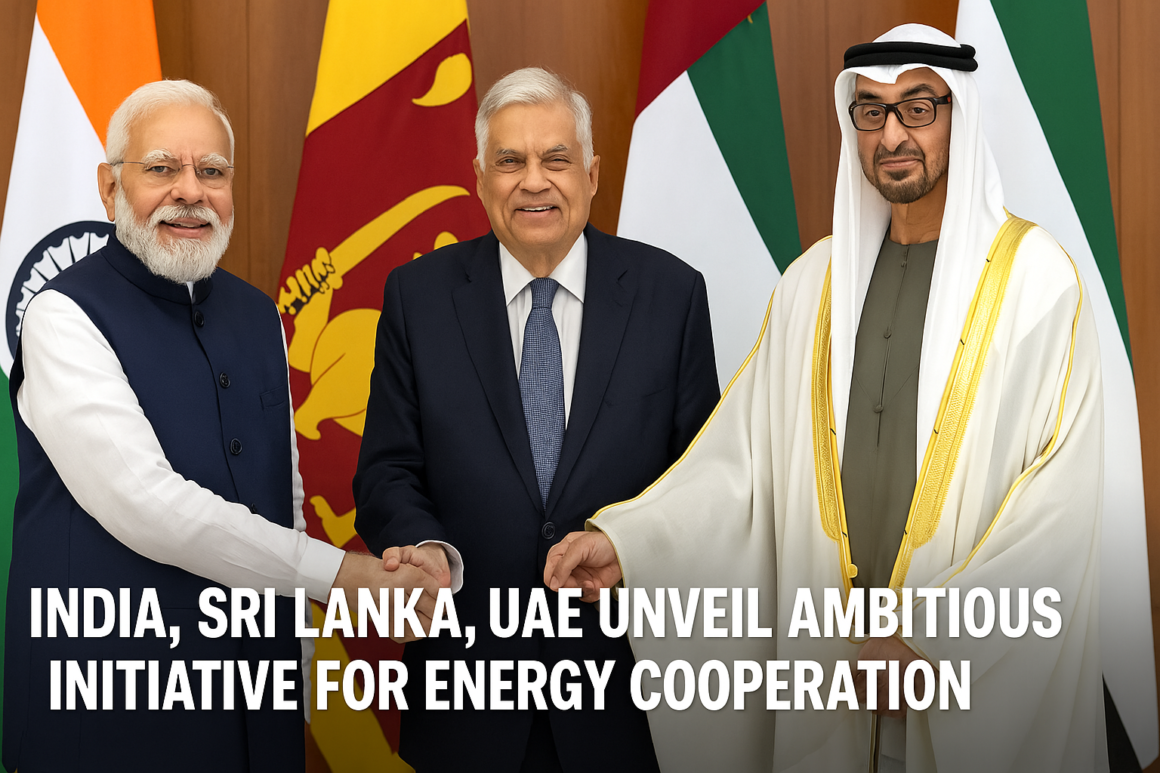The Geopolitics of Renewable Alliances
In the latest trilateral initiative, India, Sri Lanka, and the United Arab Emirates have announced a significant agreement focusing on energy cooperation aimed at bolstering regional energy stability and sustainability. Each country stands to bring unique assets to the table: India’s vast renewable resources, Sri Lanka’s strategic geographic positioning, and UAE’s substantial financial clout and investment capability1. This partnership is expected to transcend traditional energy collaborations, integrating advances in technology with infrastructural development. Critics, however, raise caution about the potentially uneven benefits2, citing past initiatives where smaller nations such as Sri Lanka might end up disadvantaged3.
Strategic Economic Implications
The economic implications of this trilateral agreement are extensive. By creating unified energy policies and fostering infrastructural synergies, the three nations aim to drive down energy costs, develop renewable energy sources, and enhance each country’s energy security4. Specifically, the integration of renewable energy technologies like solar and wind across these diverse regions could potentially revolutionize the market dynamics of the global energy sector5, promoting more widespread use of clean energy6. However, the financial burden of such advanced technological integrations might pose a significant challenge7.
The Environmental Impact Paradigm
At the heart of this initiative is the commitment to environmental sustainability. The collaborative efforts are aimed at not only strengthening the energy grids but also at significantly reducing carbon emissions in the region. This endeavor ties directly into the global environmental goals set under various international agreements such as the Paris Climate Accord8. However, realistically achieving these ambitious environmental targets presents a complex array of challenges, particularly in balancing economic growth with sustainable practices9.
Technological Innovations and Opportunities
Central to the initiative is the development and deployment of cutting-edge renewable energy technologies. India’s burgeoning tech sector, UAE’s investment in smart cities, and Sri Lanka’s initiatives in hydropower and wind energy are all pivotal to this alignment10. The seamless integration of such varied technologies across three different national frameworks could set a precedent for future international energy cooperation11. Nonetheless, technological discrepancies between the three countries could lead to implementation hurdles12.
Political Dynamics and Soft Power Play
Energy diplomacy underpins much of the cooperation between these nations. By enhancing energy ties, the UAE, India, and Sri Lanka are not only addressing their domestic energy needs but also strategically positioning themselves in a complex geopolitical chessboard13. This alliance might also influence their diplomatic relationships with both stronger and neighbouring countries, potentially reshaping regional power structures14. Critics argue for cautious optimism, suggesting that aligning such diverse political landscapes may invite unforeseen political complications15.
Impact on Local Communities
This ambitious trilateral energy initiative promises to have a marked impact on local communities. By potentially lowering energy costs and increasing energy accessibility, the initiative could vastly improve the quality of life for millions. The prospect of job creation in new energy sectors is a notable benefit16, although it also requires substantial training and skill development17. On the downside, there might be disruptions during the transitional phase to new energy infrastructures18.
Future-Proofing Energy Security
The long-term vision of the India-Sri Lanka-UAE energy agreement is firmly aimed at future-proofing the energy security of the participating countries. This involves not only the diversification of energy sources but also the establishment of resilient energy networks capable of withstanding socio-economic or environmental upheavals19. The collaboration aims to create a model of energy interdependence that promotes stability and sustainability but poses significant logistical and financial challenges20.
Navigating the Financial Landscape
Funding such a comprehensive energy initiative requires a nuanced understanding of both global financial systems and regional economic conditions. The UAE’s role as a financial powerhouse is critical, providing much-needed capital for infrastructure projects21. Yet, financial equity remains a concern, particularly for Sri Lanka, which must brace for debt sustainability issues22. Balancing investment with economic benefit to all parties will be a critical factor influencing the success of the project23.
Bridging the Cultural Divide
Effective cooperation in such a diverse tri-nation initiative also depends on intercultural understanding and mutual respect. Managing cultural differences to foster a collaborative work environment is essential for achieving the common goals of the project. Disparities in corporate and bureaucratic cultures could potentially impede smooth cooperation. Proactive cultural integration efforts and possibly cross-cultural training programs might be necessary to align diverse working styles and practices.


Leave a Reply